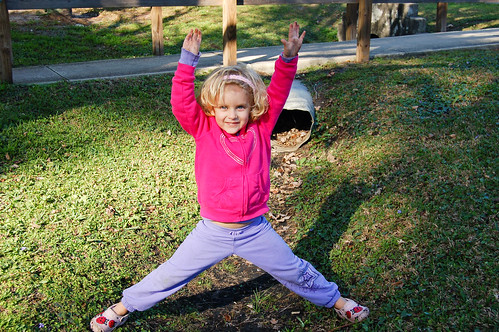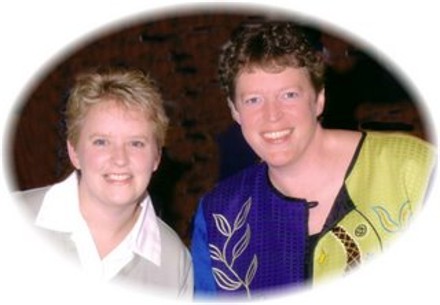She gravitated to two younger girls--GirlA and Girl B. GirlA was sweet and nice to Kylie at first. Then in November, things started to change. GirlA started playing with Kylie and then would suddenly say something like, "I never want to play with you again".
This confused Kylie. She would try to figure out what she had done to make GirlA feel this way. Kylie would try to sort it out with me. After several weeks of this behavior, I started telling Kylie that it sounded like GirlA was wishy-washy and maybe Kylie should play with other friends.
At this point, I truly didn't understand that cliques and groups had already formed. To make matters worse, GirlB started copying GirlA's behavior too.
Things came to a head when at the first of January, Kylie came home in tears. She told me about how she went from group to group of kids on the playground asking if she could play with them and no kids wanted to play with her. She spent the entire playground time trying to find someone. GirlA noticed this and at the end of playground time pointed at Kylie and said, "Ha, Ha! Kylie doesn't have any friends!" This made Kylie embarrassed, mad and sad. She later drew her first unhappy face in a drawing. She drew out the scenario.

Until now, I had approached the playground dynamics that Kylie had shared with me seriously (wanting to hear her share and validating her feelings and thoughts) yet also casually. I was shocked and surprised by the unexpected and complicated clique-y issues that surfaced. This was something I expected in middle school--not with my four year old!
Wanting to understand and take some action, I purchased this book (you've got to love the accessibility of the Kindle) and read half of it that night.
I learned about "yo-yo relationships where a close friend is often cruel or exclusionary one day and again best friends the next" and how "cruel words, silent treatment, exclusions, and backstabbing" are all forms of bullying.
I also read about active listening--a way to be attentive without imparting my feelings, values, judgments and advice. I know how to be an active listener but I honestly hadn't framed my relationship with Kylie that way. My time with her on this bullying issue had been to listen and repeat but also jump in with some advice to, I hoped, alleviate her pain and help her avoid future situations.
The next day I went out and bought this book in hard copy.
And Kylie and I sat down and read pages 45-49 on betrayal. And Kylie opened up about how GirlA and GirlB said all these mean things. As she talked, I had to keep biting my tongue and chant silently to myself, "Listen. Just listen." She would talk and then want me to read again and then she would talk some more.
My mind was reeling. I wanted to scream, "My baby is just four! FOUR! I can't believe she is having to go through this already!" But I kept listening and reading. The end of the American Girl case study story has the Kylie-character continuing to be nice to GirlA but also making other friends. GirlA had run out of chances to be Kylie's close friend. It made sense to Kylie. She decided she would make other friends.
It hasn't been easy. GirlA and GirlB want to lure her back. They say nice things to Kylie and play with her but in no time, they are back to saying mean words and excluding her. Over this month of January, Kylie has gotten over it. She's tired of their yo-yo behaviors. She tells me about other girls and boys she is playing with. When she shares with me about her playground time, I can tell things have gotten better. She shares funny stories instead of overly dramatic ones. She's calmer and happier. But she misses having "best" friends this year. She still misses her two best friends from last year and the carefree nature of their friendship.
And, as a side benefit, Kylie really uses the American Girl book. When she opens it up and brings it to me, she will show me a page with two friends who look unhappy with one another. She'll point to the picture and ask me about their story. I'll read it and then ask what is going on with her. The book has provided a way for us to talk about friendship troubles.
I'll end this long blog post with this. While sharing the story of GirlA and Kylie with different friends, I've been surprised at how many people nonchalantly shrug it off and say "Little girls are mean". I've been bombarded with advice such as "Kylie is just going to have to suck it up and toughen up" and "She'll learn to sink or swim" to "Demand that the school do something". The feedback has been all over the place.
I'm simply relieved that Kylie isn't coming to the car in tears and that I'm a little more prepared to hear about her friendship troubles. I see that my role is to empower Kylie, to role play or do whatever so that she feels strong and secure. I want to continue to strengthen my relationship with her, to be the great listener in her life not always the "know-it-all" Mommy, and to help her navigate the learning through social struggles.
Mostly, I'm very grateful that she shares so much of her day with me. I'm grateful we have the time from when school ends until bedtime to play together so that I can marinate her in lots of love.





4 comments:
I am shocked that she is already dealing with this issue. I worry so much about what our daughter will have to deal with and I just so much want to protect her as much as possible. I think you did a great job handling the situation. I'm not so sure I would have been so calm and level headed. :)
You are an amazing mom. There will always be mean girls, but teaching your daughter how to handle them without becoming one herself is a lesson she will use her entire life. You are right not to shrug it off and to be available to really listen. Hopefully she will continue to share as she gets older, and you are laying the foundation for this to happen. Bravo Mom!
Wow, you dealt with this really well. I wouldn't have known what to do except talk to the teacher. What a good approach. Oh the things I have to look forward to when my 5 month old is in preschool!! I do remember from being a little girl myself how mean little girls can be. Ugh.
Hey! I've been reading your blog for a few years now. I'm a teacher and work with kids Kylie's age (they were all four last year and are five this year). I have twenty students in my class and see this behaviour from time to time. Some of it is learned from various teachers (they have two who split the day) and some from home (siblings, parents, and the movies and tv shows they're exposed to). Depending on the class, they also learn it from one another.
As a teacher, I can tell you that sometimes it can be hard to see sometimes. The kids learn quickly that if a (good) teacher sees bullying that the bully will get in trouble. They learn to hide those behaviours from the teachers. If something is happening, it's a good idea to calmly make sure the teacher is aware of it, just in case they weren't.
Often these behaviours come from low self-esteem on the part of the bully. They have to build themselves up by putting others down (usually subconsciously). I've seem it many times. Usually, girls do it with their words and boys do it physically, although that's not a hard and fast rule.
I think you've done really well by listening to Kylie and letting her open up without input our interruption. Giving her coping techniques is also excellent. I'm dealing with this in one of my current classes, but behaviours are habits and can take a lot of time to change, even when caught early.
Good luck!
Post a Comment